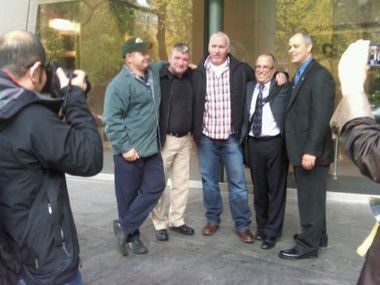Oregon Live November 2, 1012
A Portland jury found defense contractor KBR Inc. was negligent, but did not commit fraud against a dozen Oregon Army National Guard soldiers who sued the company for its conduct in Iraq nine years ago. Magistrate Judge Paul Papak announced the decision about 3:35 p.m. the U.S. Courthouse in Portland. Each soldier was awarded $850,000 in non-economic damages and $6.25 million in punitive damages.
“It’s a little bit of justice,” said Guard veteran Jason Arnold, moments after the verdict was announced Friday afternoon. Arnold was one of four of the soldier-plaintiffs in the courtroom was the verdict was read.
The verdict should send an important message to those who rely on military troops, he said.
“We’re not disposable,” said another soldier, Aaron St. Clair. “People are not going to make money from our blood.”
KBR’s lead attorney, Geoffrey Harrison, said the company will appeal.
“We will appeal the jury’s incorrect verdict,” he said. “We believe the trial court should have dismissed the case before the trial.”
Harrison said the soldiers’ lawyers produced a medical expert, Dr. Arch Carson, who offered “unsupported, untested medical opinions” that each soldier had suffered invisible, cellular-level injuries as a result of their exposure to hexavalent chromium.
The verdict means the jury did not hear clear and convincing evidence that KBR intended to deceive the soldiers in the way it operated at the Qarmat Ali water treatment plant, near Basra, Iraq. But they did find that the company failed to meet its obligations in managing the work at the plant.
Friday’s verdict closes the first phase of a web of litigation between National Guard and British troops against KBR Inc., the defense contractor they accuse of knowingly exposing them in 2003 to a carcinogen at Qarmat Ali. KBR has denied the accusations.
In Oregon another set of Oregon soldiers are waiting in the wings for their day in court. Magistrate Judge Paul Papak and the attorneys agreed earlier to hold an initial trial with the first 12 soldiers, in order to keep the proceedings from becoming too unwieldy. A second trial, featuring all or some of the remaining 21 plaintiffs, could begin in federal court in Portland this winter.
Another lawsuit brought by Indiana soldiers against KBR is on hold in federal court in Texas, while an appeals court considers a jurisdictional issue.
The cases stem from the chaotic aftermath of the U.S.-led invasion of Iraq in March 2003. The Army Corps of Engineers hired KBR Inc. to run a massive program called Restore Iraqi Oil. The program involved dozens of sites throughout Iraq — sites that neither the Army nor KBR had visited before the invasion. The project was intended to quickly restore the flow of Iraq’s oil, partly to fund the war. The Pentagon remembered the way Saddam Hussein had lit the fields on fire during the first Gulf War, and feared a repeat in 2003.
Qarmat Ali was a compound where water was pumped underground to drive oil to the surface elsewhere. For decades, Iraqis had treated the water with sodium dichromate, an anticorrosion agent that contains hexavalent chromium, a known carcinogen. (Sodium dichromate is banned in the United States.)
Iraq’s Southern Oil Co. took delivery of sodium dichromate, an orange-yellow crystalline powder, in bags that were stored on site. Soldiers and others testified that the material was loose and drifting around the site, and had contaminated areas even outside the chemical injection building where it was added to the water.
How contaminated was it? Accounts differ. Even one of the plaintiffs in this case said he didn’t notice any soil discoloration. One of the British soldiers whose testimony was prerecorded said it was everywhere. Another Oregon soldier said it settled heavily on the clothing of the soldiers, who unwittingly carried it back to their camps over the border in Kuwait.
Much of KBR’s defense in the first Oregon trial focused on just how unlikely it was that any soldier — who visited the plant at durations from one day to 21 days — could have been exposed to dangerously high levels of sodium dichromate. But one of the most gripping portions of the testimony was when Oregon veteran Larry Roberta described eating a chicken patty that had been coated with the orange crystals, which he said immediately burned in his esophagus, causing him to vomit.
Roberta now is confined to a wheelchair and takes oxygen from a tank in his backpack. He had a history of gastrointestinal issues, but attributes much of his poor health to his time at Qarmat Ali.
Harrison, KBR’s lawyer, said the company “believes in the judicial process and respects the efforts and time of the jurors,” but believes the process that brought the case to conclusion Friday shouldn’t have been allowed to come so far.
“KBR did safe and exceptional work in Iraq under difficult circumstances,” he said in a brief, prepared statement. “We believe the facts and law ultimately will provide vindication.”
Soldier-plaintiff Arnold said the message of the verdict is unmistakable. He said service members are being exploited “to this day.”
Now, he said, “the voice will be out. There will be a lot more scrutiny.”




